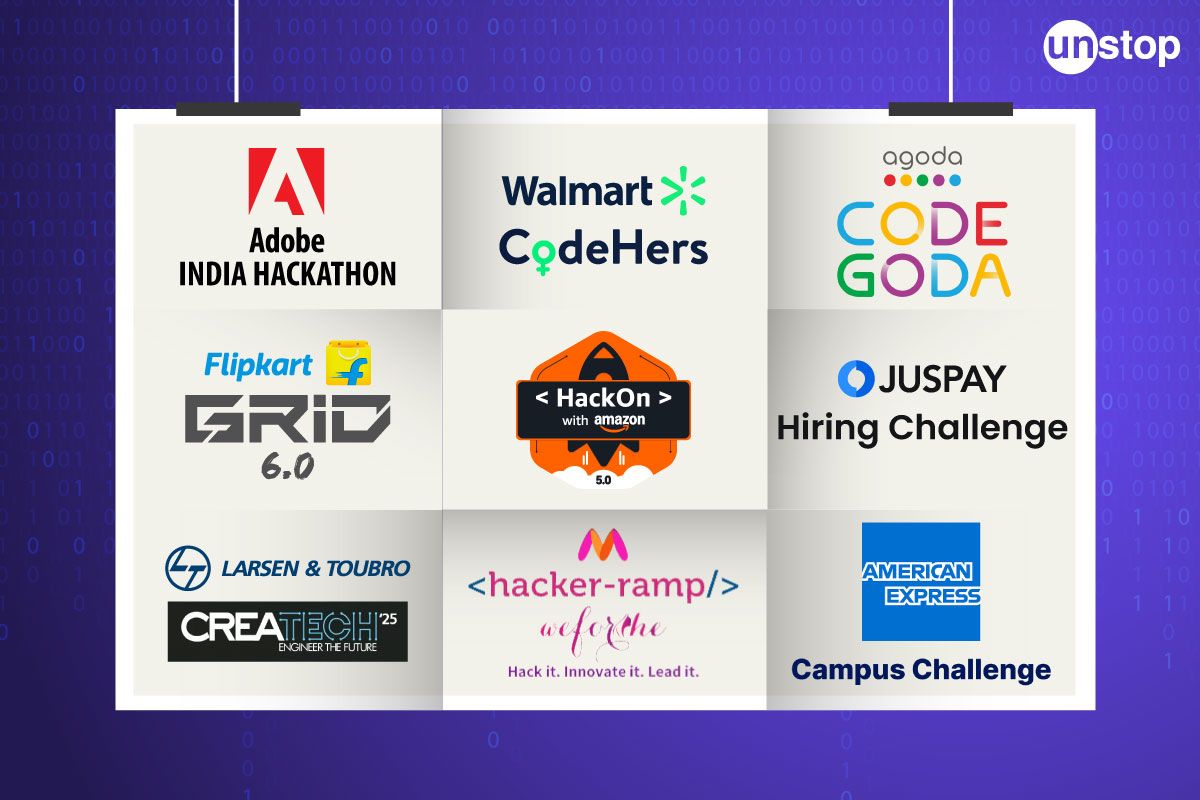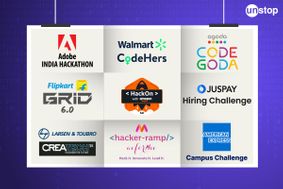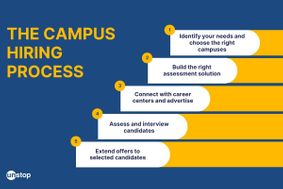- What is a Hackathon?
- Why Host/Organize a Hackathon: Strategic Goals & Benefits
- Choosing the Right Hackathon Type: Internal vs. External
- What is an Internal Hackathon & Why Organize It?
- What is an External Hackathon & Why Organize It?
- 7 Easy Steps to Organize a Hackathon: Your Execution Playbook
- Past Hackathons Organized on Unstop: Case Studies
- How to Organize/Host a Hackathon: The Key Actions Checklist
- Measuring Success: Factors Indicating a High-Impact Hackathon
- Ready to Get Started!
Organize Hackathons: The Ultimate Playbook With Past Case Studies

For forward-thinking organizations, the question is no longer why they should organize hackathons, but how to leverage them for maximum strategic impact.
Traditional approaches to engaging, branding, innovating, and hiring are becoming increasingly inefficient, and amid this, hackathons have emerged as a high-leverage tool. They are sophisticated events to accelerate employer branding, innovation, validate product roadmaps, and hiring velocity at scale.
But organizing a hackathon that attracts top-tier developers and aligns seamlessly with organizational goals requires more than just logistics; it requires a proven framework.
Drawing from our experience powering marquee engagements for industry leaders like Walmart, L&T, Myntra, Juspay, Adobe, Amazon, and many more, this guide serves as a strategic playbook. Know all about how to structure, execute, and scale a hackathon that delivers measurable business results.
What is a Hackathon?
A hackathon (a portmanteau of "hack" and "marathon") is an intensive, competitive event where a diverse group of specialized individuals collaborate to find solutions to a predefined problem statement.
Originally, hackathons were grassroots events focused purely on software development. But the definition of a hackathon has rapidly evolved beyond the traditional coding marathon. Today, a hackathon is an organizational, high-intensity, multi-phase engagement designed to crowdsource solutions, prototype concepts (PoC or MVP), and identify high-potential talent.
In short, modern hackathons are highly sophisticated strategic initiatives used for brand building, hiring, engagement, innovation, corporate social responsibility (CSR), and much more.
Why Host/Organize a Hackathon: Strategic Goals & Benefits
Hosting a hackathon is a high-leverage investment that delivers measurable returns across critical business functions. By intentionally structuring your event, you can solve specific strategic goals that traditional processes cannot address with the same efficiency or scale.
A. Strategic Branding & Market Penetration
Hosting a high-profile hackathon is a powerful, organic marketing tool that extends your brand’s reach far beyond standard advertising spend.
- Brand Penetration & Recall: The event generates significant buzz and social media presence, particularly within academic and developer communities. Consistent, quality events ensure your company becomes synonymous with innovation and technical excellence.
- Deeper Engagement: Unlike passive advertising, a hackathon requires active participation over days or weeks. This deep interaction fosters a stronger, more positive connection between participants and your brand.
B. Elevating the Employer Brand
The way a company engages with top talent fundamentally shapes its reputation in the market.
- Positioning as a Tech Leader: Successfully running a well-structured hackathon signals to the market that your company is committed to cutting-edge technology and invests in the talent ecosystem.
- Showcasing Culture: The event provides a platform to showcase your organization’s core values, mission, and the type of challenges employees work on daily, making your company an aspirational destination for top talent.
C. Driving Innovation and Product Validation
Hackathons are essentially high-speed innovation labs that can quickly solve internal problems or validate new ideas.
- Crowdsourced Problem Solving: By posing a critical business challenge as the problem statement, you harness the collective creativity of thousands of diverse participants. This approach often leads to novel, out-of-the-box solutions that internal teams may not have considered.
- Product Roadmap Validation: Prototypes developed during the event can quickly provide proof-of-concept for potential features, technologies, or entirely new products. This minimizes the risk and cost associated with committing internal resources to untested concepts.
- Adoption and Enhancement: Many winning hackathon projects transition into real-world applications that may directly enhance existing products or influence the next development cycle.
D. Accelerated Hiring & Talent Acquisition
Hackathons are the most powerful mechanism to transition from paper assessment to performance-based hiring.
- Assessment on Actual Skills: Instead of relying on degrees or resume bullet points, hackathons allow you to assess candidates’ technical depth, problem-solving agility, and coding proficiency in a live, pressurized environment.
- Building a Pre-Vetted Pipeline: The event filters thousands of applicants down to a select pool of top performers. This dramatically shortens your time-to-hire by skipping multiple preliminary interview rounds for the most qualified talent.
- Acquiring the Right Talent: You see candidates' soft skills in action, their ability to communicate technical concepts, handle conflict, and perform within a team structure, ensuring a better organizational fit.
E. Fostering Internal Culture & Retention (Employee Engagement)
Internal hackathons are invaluable tools for talent management, culture building, and maintaining an innovative workforce.
- Boosted Employee Morale: They provide a fun, high-energy departure from routine tasks, improving overall job satisfaction and excitement about the company’s mission.
- Cross-Functional Collaboration: Internal events break down departmental silos, allowing employees from different teams to collaborate, network, and exchange knowledge.
- Talent Retention & Low Attrition: By giving employees a space for self-directed innovation and recognizing their efforts, you demonstrate value, which is crucial for retaining high-performing technical talent. It acts as an internal career accelerator.
Choosing the Right Hackathon Type: Internal vs. External
Before diving into the logistical steps, let’s look at an important strategic decision in determining the scope of your event: Internal or External.
The choice dictates everything, from the problem statements and marketing strategy to the expected return on investment (ROI). Understanding the distinction between the two is crucial, as each type solves a fundamentally different business objective.
|
Feature |
Internal Hackathon |
External Hackathon |
|
Primary Goal |
Employee engagement, Innovation, Talent retention, Cross-functional collaboration |
Talent acquisition, Employer branding, Market penetration, Crowdsourced innovation |
|
Audience |
Current employees across all departments |
External talent (Students, working professionals, specific communities, etc.). |
|
Key Metric |
Employee engagement score, innovation funnel velocity, attrition rate reduction, product/process improvement adoption, etc. |
Qualified applications, offer acceptance rate, cost-per-hire reduction, brand sentiment/reach, etc. |
|
Problem Focus |
Solving internal inefficiencies, validating product features, exploring new internal tools, and internal innovation challenges |
Testing specific technical skills, real-world business challenges, building MVPs around public-facing products/APIs |
What is an Internal Hackathon & Why Organize It?
An internal hackathon is meant exclusively for your organization's existing employees. It can serve multiple purposes like talent management, morale, boost, innovation, etc. The idea is to utilize existing workforce expertise. This format can be viewed as a high-impact internal career accelerator and retention strategy.
The Benefits/Objectives of Organizing an Internal Hackathon
- Employee Engagement & Morale Upliftment: Internal hackathons boost morale, provide a high-energy break from routine, and are a powerful antidote to burnout. They enhance an employee’s association with the organisation and improve the retention rate.
- Fostering 'Intrapreneurship' & Innovation: By giving employees time to work on self-selected, creative projects, you signal a strong commitment to innovation. This empowers the talent, directly contributing to lower attrition rates.
- Identifying High-Potential Talent: Traditional performance reviews can miss hidden talent. Internal hackathons are the ultimate meritocratic counter to such possibilities. They allow managers to identify employees who possess strong leadership, rapid problem-solving, and cross-functional communication skills under pressure, qualities essential for future leadership roles.
- Breaking Down Silos & Promoting Collaboration: These events allow talent to collaborate with other teams on a focused goal. This organically improves inter-departmental understanding, communication, and alignment, making your organization more agile.
- High-Speed Product Validation & Internal Tooling: Instead of crowdsourcing ideas from the market, you crowdsource solutions for internal bottlenecks. Teams can prototype and validate internal dashboards, efficiency tools, or small feature improvements that streamline operations, yielding immediate ROI in productivity gains.
What is an External Hackathon & Why Organize It?
An external hackathon is open to participants outside your organization, typically students, university graduates, or experienced working professionals, as per your organizational goals. They serve as powerful tools for talent acquisition, market branding, and more.
The Benefits/Objectives of Organizing an External Hackathon
- Market Penetration: They double up as a large-scale PR events, which help in establishing the brand and boosting brand recall within a wide community.
- Crowdsourcing ideas/ solutions: Opening real business problems/ challenges to a wide and diverse talent can help crowdsource out-of-the-box ideas at a much faster pace. Also, external talent brings in fresh, outside-in perspectives to the solution/idea pool.
- Massive Employer Branding: Hosting a large-scale event generates organic buzz amogst future talent, developer communities, and universities. They position your brand not as a passive advertiser, but as an active, cutting-edge thought leader in technology, making your company an aspirational destination for talent.
- Diversity and Inclusion: External hackathons, especially when hosted virtually on a platform like Unstop, eliminate geographical bias and broaden the reach beyond tier-1 institutions. By offering specialized tracks or focusing on inclusive themes, TA teams can strategically source candidates from diverse backgrounds, ensuring a balanced hiring pool.
- Performance-Based Hiring: An external hackathon allows recruiters to replace several stages of traditional assessment (resume screening, preliminary interviews, coding tests) with a single, high-fidelity data point, i.e., actual performance. You assess thousands of candidates in parallel and fast-track the top 5% directly to final interview rounds.
- Cost and Time Savings in Hiring: In addition to performance-based/skill-first hiring, these events also drastically reduce time-to-hire and cost-per-hire by focusing recruiter effort solely on the highest-performing, pre-vetted candidates.
- Future-Proofing Talent: By designing problem statements around next-generation technologies, you can identify and engage with the niche talent already mastering the skills your company will need in 3-5 years, effectively future-proofing your talent pipeline.
7 Easy Steps to Organize a Hackathon: Your Execution Playbook
Executing a successful hackathon that delivers measurable ROI requires moving beyond simple checklist completion. It demands a structured, phased approach where every step is strategically aligned with your overarching business goal (Hiring, Innovation, or Branding).
Drawing from our experience in running some of the world's largest hackathons, this playbook distills the process into seven critical, phased steps designed to maximize efficiency and impact, ensuring you transition smoothly from strategic vision to flawless execution. Here are the seven key phases of your hackathon execution journey:
Step 1: Strategic Alignment & Goal Definition (The Why & Who)
Step 2: Platform Selection & Logistics Setup (The Where & When)
Step 3: Crafting the Problem Statement & Rules (The Challenge)
Step 4: Targeted Marketing & Participant Recruitment (The Reach)
Step 5: Event Execution & Making it Fun (The Experience)
Step 6: Judging, Evaluation, & Shortlisting (The Filter)
Step 7: Post-Event ROI Measurement (The Impact)

If you are considering organizing a hackathon, these seven steps will help materialize your hackathon into a successful event.
#1. The Why & Who: Strategic Alignment & Goal Definition
The most common reason for a hackathon's failure is a lack of clearly defined, quantifiable goals before planning begins. Do not confuse activity with strategy. Your hackathon is not the goal; it is a mechanism to achieve a business outcome.
|
Strategic Goals |
Example Key Metric (KPI) |
Ideal Hackathon Type |
|
Talent Acquisition |
Shortlist 50 qualified candidates for final interviews. |
External |
|
Employer Branding |
10,000+ registrations and 2X increase in LinkedIn reach. |
External |
|
Internal Innovation |
Generate 3 viable PoCs for a new feature roadmap. |
Internal |
Things to keep in mind:
- Define Quantifiable Goals: State precisely what success looks like. Instead of "Improve hiring," specify: "Reduce the Time-to-Hire for specialized ML Engineers by 30 days."
- Identify the Target Audience: Define the participant persona (e.g., Final-year B.Tech students from Tier-1/Tier-2 colleges in India, or Mid-level data scientists across a specific location). This dictates your marketing, platform, and problem statement complexity.
Determine Budget and Team: Allocate sufficient funds for the platform, marketing, prizes, and logistics. Assemble a core organizing committee with cross-functional representation (HR/TA, Tech, Marketing).
#2. The Where & When: Platform Selection & Logistics Setup
The platform is the digital ecosystem that powers your entire event, from initial registration to final candidate shortlisting or offer rollouts. Choosing the right partner is the most consequential logistical decision, as it dictates your potential scale, brand representation, and the accuracy of your results. Choosing the wrong one can turn a high-leverage event into a logistical nightmare.
A hackathon platform must be more than just a host; it must act as a strategic enabler, serving multiple organizational goals efficiently and providing a seamless experience for both participants and organizers.
Strategic Imperatives for Platform Selection
When evaluating potential partners, ensure the platform provides a single, integrated solution for the following capabilities, regardless of your primary goal (hiring, innovation, branding, or engagement):
- Seamless, End-to-End Experience: The platform must offer a one-stop solution that guides participants effortlessly from registration and team formation through submission and final results. This reduces dropout rates and enhances the overall employer brand perception.
- High-Fidelity Assessment & Integrity: Crucial for talent acquisition, the platform must ensure the reliability of results. Look for advanced features that confirm the authenticity of the performance, allowing recruiters to trust the data.
- Key Capabilities: Robust, customizable Proctoring (for external events), automated Plagiarism Checks, and secure coding environments.
- Automation for Scale and Efficiency: Manual processes are the enemy of scale. The platform should automate repetitive, high-volume tasks related to communication, scoring, and data management, freeing up organizational time for strategic tasks (like mentorship and judge calibration).
- Key Capabilities: Automated Scoring against set rubrics, bulk communication tools, and real-time leaderboard management.
- Deep Customization and Branding: The platform is your digital storefront. It must allow for the creation of a fully branded microsite that aligns perfectly with your company's visual identity, mission, and the specific goals of the hackathon (e.g., highlighting diversity goals or innovation tracks).
- Data-Driven Insights and Reporting: For the event to deliver measurable ROI, the platform must generate rich, actionable data. This is vital for recruiters (skill gaps, top-performer demographics) and product leaders (innovation funnel velocity).
- Key Capabilities: Detailed participant analytics and reporting on project documentation or code review results.
- Integration with Core Systems: The platform must integrate smoothly with your existing stack, like your Applicant Tracking System (ATS), for easy exporting of pre-vetted candidate lists.
Defining the Event Timeframe
Before launch, the logistics setup must include defining a suitable duration. The modern hackathon landscape is diverse, ranging from highly intense sprints to long-format, multi-stage events that span several weeks or even months.
- The chosen timeframe must reflect the complexity of the challenge and the depth of the solution expected.
- More complex business problems require longer, phased timelines, which are best managed by a robust platform that can handle multiple submission deadlines and interim checkpoints.
#3. The What/Challenge: Crafting the Problem Statement & Rules
The problem statement is the engine of your hackathon. A well-crafted challenge is both a high-fidelity assessment tool and an innovation driver. This phase requires strategic alignment to ensure measurable ROI.
Designing the Challenge: Alignment with Strategic Goals
The challenge must be intrinsically linked to your primary goal: hiring, engagement, innovation, or branding.
|
Goal |
Challenge Focus |
|
Talent Acquisition |
Testing job-critical technical skills for specific open roles. |
|
Innovation & Product |
Solving genuine internal bottlenecks or prototyping future product features. |
|
Employer Branding |
A broad, high-visibility, or socially impactful theme. |
Things to keep in mind:
- Clarity is Key: Define the scope, constraints (e.g., required tech stack), and the exact expected deliverable (PoC, working code).
- Real-World Assets: Provide high-quality, sanitized datasets and APIs. Participants should focus on solving the problem, not the setup.
- Integrity: Clearly define eligibility, team size limits, and strict penalties for plagiarism or cheating.
- Prizes: Transparently communicate all rewards (job offers, cash, mentorship) as these are the primary motivators.
#4. The Reach: Targeted Marketing & Participant Recruitment
Marketing for a hackathon is highly targeted outreach. The strategy must attract the precise talent profile needed to meet your goals.
External Strategy: Sourcing the Right Candidates
Focus on quality and efficiency while maximizing quantity registrations.
- Platform Community Leverage: Use the hackathon platform's community and AI-targeting tools to send personalized emails/comms to candidates matching the set audience requirements.
- Targeted Outreach: Partner with placement cells at target institutions and engage specific technical communities relevant to the challenge. Modern hackathon platforms have pre-engaged communities and network with all relevant TPOs, etc.
- Incentivize Momentum: You can also use early-bird perks and initial training workshops to build buzz, drive organic social sharing, and create a quality funnel early on.
Internal Strategy: Maximizing Engagement
For internal events, focus on engagement and skill diversity across departments.
- Executive Buy-in: Secure a high-profile endorsement (CTO/CIO) to signal the event is a strategic priority, not just an HR activity.
- Protected Time: Mandate official time away from daily duties for participation. This signals genuine organizational commitment.
- Value Proposition: Market the personal benefits like cross-functional visibility, skill development, and potential internal career calibration for winners, or funding for winning ideas.
#5. The Experience: Event Execution & Making it Fun
Flawless execution transforms a simple hackathon into a memorable, high-impact experience that helps achieve all your organizational goals. Success in this phase hinges on robust support infrastructure and high-quality engagement.
- Seamless Execution Hub: The platform must offer a centralized hub for announcements, Q&A, technical support, and team communication. This minimizes friction and keeps participants focused on problem-solving.
- The Fun Factor (Culture Building): As Dale Carnegie said, "People rarely succeed unless they have fun in what they are doing." Integrate non-coding elements (quizzes, treasure hunts, virtual games) to sustain participant energy, build morale, and enhance culture building.
- Strategic Mentorship: Mentors are not just technical advisors; they are brand ambassadors and evaluators.
- Utilize your top internal talent as mentors. This provides valuable "on-the-job" assessment, helping identify high-potential external talent (for hiring) or driving better solution quality (for innovation).
- Ensure mentors are available and accessible across the event's duration.
#6. The Filter: Judging, Evaluation, & Shortlisting
This phase is critical to converting your strategic investment into measurable results. Effective judging ensures you accurately filter thousands of entries down to a qualified talent pipeline or high-value innovation concepts.
- Judge Panel Diversity: Assemble a panel that includes both technical experts (for code quality/scalability) and business stakeholders (for viability/market fit).
- Calibration Session: Before the event, ensure all judges understand the criteria weighting and agree on the definition of 'Excellent' versus 'Good' for each category. This eliminates bias.
- Phased Evaluation: It is ideal to employ a multi-stage process:
- Platform Screening: Automated scoring filters the bottom percentage quickly.
- Semi-Finals: Internal technical teams review submissions based on code quality.
- Finals: The diverse panel judges the top projects and live presentations.
- Objective Scorecard: Evaluation data is the most valuable output. Judges must use a structured scorecard (integrated into the platform) based strictly on the weighted criteria. This translates performance directly into actionable hiring or innovation data.
#7. The Impact: Post-Event ROI Measurement
A hackathon's true value is realized after the event ends. This phase transforms raw data into actionable business outcomes for talent, branding, and innovation.
- Immediate Handoff:
- Talent: Communicate the next steps (interview invites, screening waivers) to the shortlisted talent within 48 hours. Speed is essential to securing top talent.
- Innovation: Winning internal solutions must be handed over to the relevant product or internal teams for potential integration.
- Track Metrics: Track metrics that prove the hackathon delivered on the strategic goals set in Phase 1.
- Post-Mortem Analysis: Conduct a thorough internal review (what worked, platform performance, budget adherence) to create a repeatable and scalable playbook for the next event.
Past Hackathons Organized on Unstop: Case Studies
The ultimate validation of a structured hackathon strategy is the real-world ROI delivered across scale, quality, and hiring conversion. The following case studies showcase how leading global organizations leverage the Unstop platform to achieve complex, measurable goals.
|
Hackathon/ Event |
Primary Goal |
Scale & Reach |
Impact |
|
Innovation, Branding & Engagement at Scale |
2,62,132 registrations from 10,946 campuses, & 13.9M+ impressions |
Largest AI/ML Hackathon in India: Validated massive engagement and established thought leadership in Document Cloud Intelligence. |
|
|
Meeting Gender Diversity Mandates |
1,13,186 registrations and 18M+ impressions (2026) |
Female coders were hired in double digits in the first two seasons, 2x of the set target. |
|
|
3. CodeAgoda |
Global Talent Sourcing & Brand Penetration |
50,233 global registrations & 69 Lakh aspiring engineers reached. |
Achieved massive brand reach at a global level and engagement with the talent community worldwide. |
|
Mass Engineering Talent Acquisition & Brand Reach |
5,21,275 registrations & 20M+ impressions |
Identified talent from across the nation, including tier 2/3 cities, broadening the hiring pipeline beyond traditional targets. |
|
|
Large-Scale Engagement & Branding |
50k+ registrations from select audience & 52L+ impressions |
Crowdsourced innovative ideas/solutions to improve services, add benefits and features, and invent new products. |
|
|
High-Velocity, Specialized Hiring |
2,02,148 registrations & 13M+ impressions |
Achieved rapid closure for specialized payments positions with PPOs. |
|
|
7. L&T CreaTech |
Internal & External Innovation/IP Generation |
14,863 registrations & 10M+ impressions across select institutes |
Gave PPIs to select talent and directly feed winning innovative concepts into the internal funnel. |
|
Strategic Gender Diversity & Talent Acquisition |
56,262 registrations from female coders across the nation |
Successfully met diversity hiring targets and provided a clear, merit-based career pathway for women in tech with PPIs. |
|
|
Niche Skill Acquisition & Talent Scouting |
11,753 registrations across select campuses & 11M+ impressions |
High-fidelity assessment of candidates' statistical modeling and business application skills, feeding them into the talent pipeline with PPIs. |
How to Organize/Host a Hackathon: The Key Actions Checklist

The detailed process of organizing a hackathon can be distilled into six critical, non-negotiable actions. This checklist summarizes the required steps for successful deployment, ensuring you move from concept to execution flawlessly.
|
Action Item |
Core Responsibility |
Strategic Goal Link |
|
1. Define Core Strategy |
Finalize objective (Hiring/Innovation/Branding), budget, and target audience. |
Ensures measurable ROI |
|
2. Secure Platform & Partner |
Select a full-lifecycle management platform (like Unstop) and establish the core team. |
Guarantees scalability, integrity, and operational ease |
|
3. Lockdown Problem Statement |
Define the challenge, eligibility, rules, and weighted judgment criteria. |
Ensures assessment fidelity and project quality |
|
4. Maximize Targeted Outreach |
Implement a focused marketing plan that utilizes the platform's community and TPO network. |
Secures the right quantity and quality of talent (Phase 4). |
|
5. Standardize Execution |
Draft all correspondence materials and set up mentor accessibility. |
Ensures a smooth, professional participant experience (Phase 5). |
|
6. Implement ROI Tracking |
Establish metrics to track success post-event (e.g., CPH, IP Adoption, Impressions). |
Confirms business value and creates a scalable playbook (Phase 7). |
Measuring Success: Factors Indicating a High-Impact Hackathon
A successful hackathon is one that meets its primary strategic goals (Phase 1). Beyond simply completing the event, success is indicated by the following outcomes:
- High-Fidelity Talent Pool: A high volume of participation from your target audience, resulting in a shortlist of highly qualified, pre-vetted candidates.
- Viable Innovation Bank: Getting a bank of high-quality, viable ideas, concept proofs, and prototypes that are ready for internal handoff.
- Strong Brand Sentiment: A high number of impressions, positive feedback from participants, and significant popularity across social media platforms.
- Flawless Implementation: A conflict/issue-free implementation and execution, proving the stability of the platform and the robustness of the planning.
Remember, learning, innovation, collaboration, and engagement lie at the core of almost all hackathon ideas.
Ready to Get Started!
We have stepped into a new age of hiring and engagement solutions. This post has served as a comprehensive guide to converting your hackathon idea into a high-impact reality.
However, moving from theory to flawless execution at scale requires a dedicated partner.
Unstop is the leading platform that conducts all such employer branding, talent acquisition, and engagement experiences. Reach out to us at coffee@unstop.com to develop a hackathon idea, custom-made to help you tap into the Unstoppable talent.
An economics graduate with a passion for storytelling, I thrive on crafting content that blends creativity with technical insight. At Unstop, I create in-depth, SEO-driven content that simplifies complex tech topics and covers a wide array of subjects, all designed to inform, engage, and inspire our readers. My goal is to empower others to truly #BeUnstoppable through content that resonates. When I’m not writing, you’ll find me immersed in art, food, or lost in a good book—constantly drawing inspiration from the world around me.
Login to continue reading
And access exclusive content, personalized recommendations, and career-boosting opportunities.
Subscribe
to our newsletter
Blogs you need to hog!

Organize Hackathons: The Ultimate Playbook With Past Case Studies

What is Campus Recruitment? How To Tap The Untapped Talent?

Lateral Hiring: A Complete Guide To The Process, Its Benefits, Challenges & Best Practices











Comments
Add comment